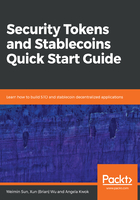
Coins and tokens
When we talk about blockchain and cryptocurrency, many people use coin and token interchangeably and treat them as synonyms. In fact, they are not necessarily identical. There are differences between them.
A currency is required to have three functions:
- Circulation as a medium of exchange: Units of the currency paid by a buyer to a seller in exchange for goods or services from the seller
- Unit of account: Value of goods or services can be measured by a currency
- Store of value: Being treated as an asset that can be saved, retrieved, and exchanged in the future for other assets or goods and services
The US dollar is an example of a currency that incorporates the preceding three functions. A currency that's issued by a central bank of a country often has both paper bills with different denominations (for example, $1, $2, $5, $10, $20, $50, and $100 bills for USD) and metal coins (for example, penny, nickel, dime, quarter, dollar, and so on). Cryptocurrency is a digital form of currency. Bitcoin satisfies all three functions of a currency and exists only digitally. Therefore, it is a cryptocurrency.
Blockchain coins are created using encryption techniques and store value over time. Coins are used for circulation and can pay for goods and services, as long as a seller accepts them. In other words, it is correct to refer to coins as cryptocurrencies. Hence, the term coin refers to digital money. Besides bitcoin, other well-known coins are Ripple, Ether, and EOS. Coins share similar characteristics as money. For example, they are fungible, divisible, portable, and durable. The maximum number of coins to be minted is fixed at the time when a coin is initially launched.
Some coins are issued based on the original protocol proposed by Satoshi Nakamoto, such as bitcoin, bitcoin cash, and bitcoin SV. Other coins are issued following a new protocol that is derived and enhanced from the original protocol, for example, Ether and Ripple. Coins exist on public blockchain platforms only. Private blockchain usually doesn't involve a coin.
Tokens are digital assets that are created for a project. They are used as a way to facilitate payments within the project's ecosystem. In this ecosystem, the project-specific tokens play a similar role to coins.
Tokens can be further categorized into security tokens and utility tokens. Security tokens give holders a share of a company's ownership, for example, tokens issued by the Decentralized Autonomous Organization (DAO) project. Utility tokens give holders access to the product or service on the blockchain platform.
Tokens issued by following Ethereum ERC-20 token standards are examples of tokens. Tokens are not intended for circulation. Outside its intended project, tokens cannot be used to pay for goods and services. Therefore, tokens should not be treated as cryptocurrencies.
Another difference between coins and tokens is how they are implemented technically. Usually, significant effort is required to write new code in order to issue a new type of coin (cryptocurrency). Ether and EOS are coins that were issued on the Ethereum and EOS blockchain platforms, respectively.
Creating a token is a lot easier. For example, Ethereum ERC-20 tokens can be issued by supplying mandatory parameters, for example, the token name and the total number of tokens, to a template. This involves very minor coding and requires only a few steps to complete. ERC-20 tokens that are created for different projects on Ethereum can be converted into each other and use the same wallet.
In summary, the main differences between coins and tokens are as follows:
- Coins are a way of payment, whereas tokens can represent a share of a company's stake or provide access to a product or service on the platform.
- Coins are cryptocurrencies that can be used like a currency to buy or sell goods and services. You can use a coin to purchase a token, but you can't use a token to buy a coin.
- Coins can operate independently of a project's ecosystem, whereas tokens have a specific usage within the project's ecosystem only.